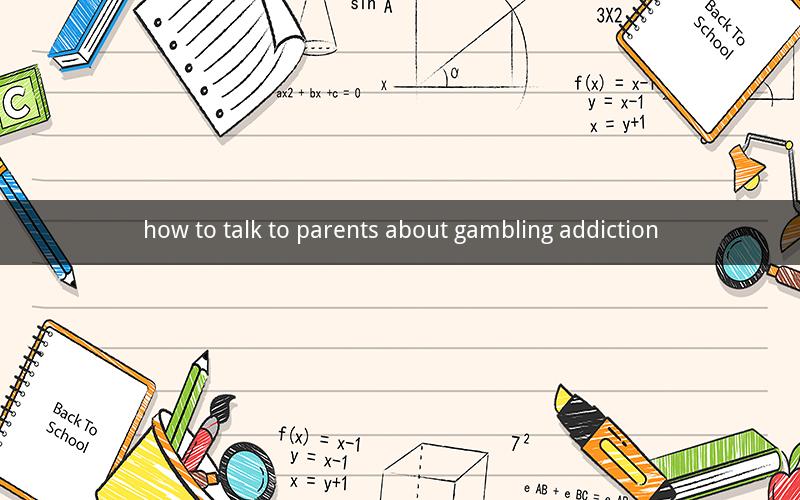
Table of Contents
1. Understanding the Problem
2. Preparing for the Conversation
3. Choosing the Right Time and Place
4. Expressing Concerns Clearly
5. Listening to Their Perspective
6. Educating About Gambling Addiction
7. Offering Support and Resources
8. Setting Boundaries and Expectations
9. Dealing with Resistance
10. Maintaining Open Communication
---
1. Understanding the Problem
Before you can effectively communicate with your parents about their gambling addiction, it's crucial to have a clear understanding of the issue. Gambling addiction is a complex disorder characterized by an inability to control gambling behavior, leading to significant harm in various aspects of life, including financial, emotional, and social well-being.
2. Preparing for the Conversation
To ensure the conversation goes smoothly, prepare yourself mentally and emotionally. Reflect on your own feelings and concerns, and consider what you hope to achieve from the discussion. It may also be helpful to research gambling addiction and familiarize yourself with the signs and symptoms.
3. Choosing the Right Time and Place
Select a time and place where your parents are likely to be relaxed and open to discussion. Avoid confrontational situations or when they are under stress. A calm, private setting is ideal.
4. Expressing Concerns Clearly
Start the conversation by expressing your love and concern for your parents. Use "I" statements to avoid sounding accusatory. For example, "I'm worried about you because I see how gambling is affecting your life."
5. Listening to Their Perspective
Allow your parents to share their thoughts and feelings without interrupting. This is an opportunity for them to express their struggles and fears. Show empathy and validate their emotions, even if you don't agree with their behavior.
6. Educating About Gambling Addiction
Educate your parents about gambling addiction, explaining that it is a treatable condition. Discuss the consequences of their behavior and how it impacts the family. Provide resources and information about treatment options and support groups.
7. Offering Support and Resources
Reassure your parents that you are there to support them through this difficult time. Offer to help them find professional help, such as a therapist or counselor specializing in gambling addiction. Provide them with a list of resources and support groups in your area.
8. Setting Boundaries and Expectations
Discuss the consequences of continued gambling behavior and set clear boundaries. This may include limiting access to money or restricting their ability to gamble. Be firm but compassionate in your approach.
9. Dealing with Resistance
Your parents may resist your efforts to help. Be prepared for this and remain patient. Offer your support and understanding, even if they are initially unwilling to seek help. Encourage them to attend support groups or counseling sessions where they can connect with others who understand their struggles.
10. Maintaining Open Communication
Keep the lines of communication open. Check in regularly with your parents, and let them know you are available to talk whenever they need it. Continue to offer support and resources, and be patient as they work through their addiction.
---
10 Questions and Answers
Question 1: How can I approach my parents if I'm worried about their gambling?
Answer: Choose a calm, private setting and express your concerns using "I" statements. Focus on your feelings and how their behavior affects you, rather than placing blame.
Question 2: What if my parents deny they have a problem?
Answer: It's important to remain patient and non-confrontational. Offer your support and encourage them to seek professional help. Provide resources and information about gambling addiction to help them understand the issue.
Question 3: How can I help my parents find treatment for their addiction?
Answer: Research treatment options in your area and offer to help them schedule appointments. Provide them with a list of therapists, counselors, and support groups specializing in gambling addiction.
Question 4: What if my parents are resistant to change?
Answer: Be persistent and patient. Continue to offer your support and resources, and encourage them to attend support groups or counseling sessions. Understand that change takes time, and they may need multiple opportunities to consider seeking help.
Question 5: How can I support my parents during their recovery process?
Answer: Offer emotional support, be a good listener, and encourage them to stay connected with their support network. Help them set goals and celebrate their progress, no matter how small.
Question 6: What if my parents' gambling addiction is causing financial problems for the family?
Answer: Discuss the financial consequences of their behavior and set clear boundaries to protect the family's financial stability. Consider seeking legal advice if necessary.
Question 7: How can I help my parents cope with the stress of their addiction?
Answer: Encourage them to engage in healthy coping mechanisms, such as exercise, hobbies, or joining a support group. Offer to help them find a therapist who specializes in stress management and addiction.
Question 8: What if my parents' addiction is causing tension in the family?
Answer: Focus on maintaining open communication and setting boundaries. Encourage family members to express their feelings and concerns, and work together to create a supportive environment.
Question 9: How can I support my parents if they relapse?
Answer: Offer your support and understanding. Encourage them to return to treatment and remind them that relapse is a part of the recovery process. Continue to be a source of strength and encouragement.
Question 10: What can I do to take care of myself while supporting my parents through their addiction?
Answer: Set aside time for self-care, seek support from friends and family, and consider joining a support group for loved ones of individuals with gambling addiction. Remember that taking care of yourself is essential for providing effective support to your parents.